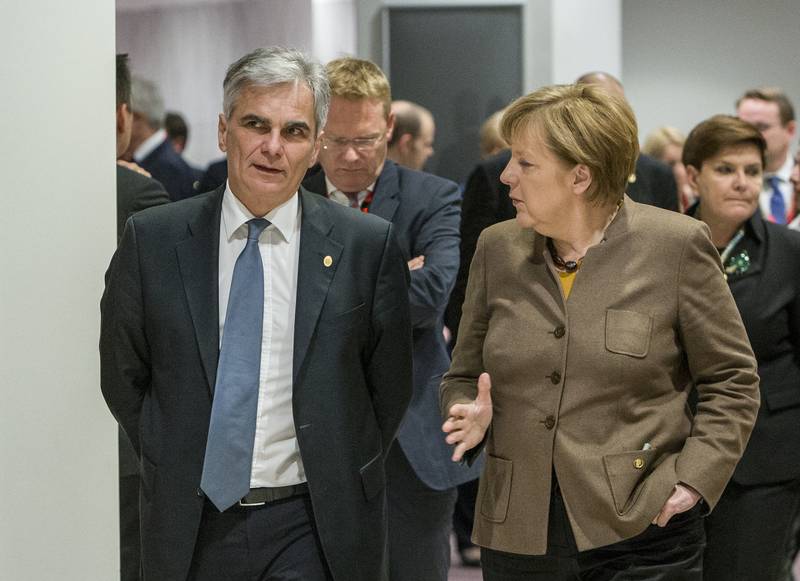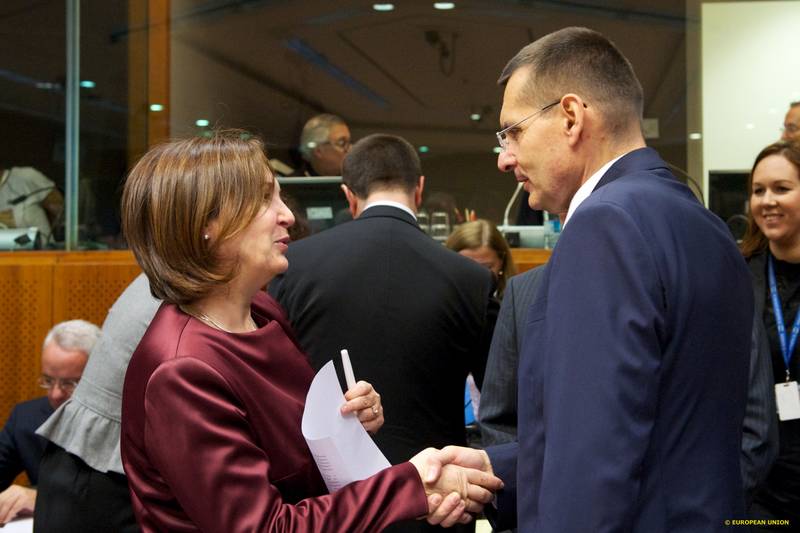The long way to Schengen
Ralitsa Kovacheva, January 3, 2011
 I tried to count how many times Prime Minister Boyko Borissov reported in 2010 the restored Brussels's trust in Sofia as a success of his party GERB (Citizens for European Development of Bulgaria). And how many times the entry of Bulgaria into the Schengen area in March 2011 was declared as an absolutely certain fact and, in this sense - as the biggest success of the government. The conviction of the government was not shaken even when the first signals from the Member States appeared that the implementation of the technical criteria for the Schengen accession is a necessary but not a sufficient condition.
I tried to count how many times Prime Minister Boyko Borissov reported in 2010 the restored Brussels's trust in Sofia as a success of his party GERB (Citizens for European Development of Bulgaria). And how many times the entry of Bulgaria into the Schengen area in March 2011 was declared as an absolutely certain fact and, in this sense - as the biggest success of the government. The conviction of the government was not shaken even when the first signals from the Member States appeared that the implementation of the technical criteria for the Schengen accession is a necessary but not a sufficient condition.
It became clear that our partners in the EU want when the political decision is being taken (by the Council of Ministers) for Bulgaria's and Romania's accession into the Schengen area, the CVM reports of the European Commission to be taken into account. The CVM (Cooperation and Verification Mechanism) has been imposed on Bulgaria after its EU accession in 2007 due to the problems in the judiciary and home affairs.
First and most determined was the Netherlands - even in the coalition agreement of the new Dutch government it is noted: "In the context of Europe, the government will argue for the inclusion of the two-yearly reports on corruption and legal reform in Romania and Bulgaria in the Schengen evaluation of these two countries. If these reports show that they do not meet the strict criteria, the Netherlands will not support the full accession of Romania and Bulgaria to Schengen and abolition of the internal border controls in the EU, and Bulgaria and Romania will not be admitted to Schengen."
Because you should agree that the security of EU's external borders depends not only on what kind of ships patrol the border, or is there a sufficient number of helicopters and what are the police computers. The keywords here, as well as in the CVM reports of the Commission, are "corruption" and "organised crime". And the reports haven’t noted any progress in these painful areas, although the latest report registered the existence of "political will".
Despite the increasing pressure from Member States in this direction, the Bulgarian authorities persistently argue that the decision on Bulgaria's accession to the Schengen area would be a fact in the spring of 2011. The only sign that something goes wrong, was the appearance of the word “technical” in the statements of Prime Minister Boyko Borissov and Interior Minister Tsvetan Tsvetanov with regard to Sofia’s accession to the Schengen zone. And Bulgaria’s readiness for Schengen turned into a simply “technical” one.
Foreign Minister Nickolay Mladenov was the first who admitted that, though there was no formal link between the accession to the Schengen area and the CVM, there was a political link, and a future decision would depend on the results in the report of the Commission. Which report however – the interim in February or the annual one in July?
The official Bulgarian position has been tirelessly repeating the position of the Commission that there is no link between Schengen and the CVM. Although, as the Commission shyly stated, the decision had to be taken by the Council of Ministers, i.e. by the Member States. On December 20, in response to euinside's question, Interior Minister Tsvetanov explained that linking the country's accession to Schengen with Commission’s CVM report had been “dropped out”. The very next day we got the news that the interior ministers of Germany and France had sent a letter to the Commissioner of Home Affairs, Cecilia Malmstrom, where they bluntly put all Member States' concerns of a possible “premature” admission of Bulgaria and Romania to the Schengen area.
there is no link between Schengen and the CVM. Although, as the Commission shyly stated, the decision had to be taken by the Council of Ministers, i.e. by the Member States. On December 20, in response to euinside's question, Interior Minister Tsvetanov explained that linking the country's accession to Schengen with Commission’s CVM report had been “dropped out”. The very next day we got the news that the interior ministers of Germany and France had sent a letter to the Commissioner of Home Affairs, Cecilia Malmstrom, where they bluntly put all Member States' concerns of a possible “premature” admission of Bulgaria and Romania to the Schengen area.
 In its Brussels blog the Financial Times published a letter with an English translation of that letter. Thomas de Maiziere and Brice Hortefeux stress in that, although there was no direct link between joining Schengen and the CVM, “it does not seem to us realistic or responsible to ignore identified defects”, namely: “the absence of a satisfactory administrative and legal environment in the field of security and justice, the phenomena of corruption at different levels and the persistence of alarming organized crime”.
In its Brussels blog the Financial Times published a letter with an English translation of that letter. Thomas de Maiziere and Brice Hortefeux stress in that, although there was no direct link between joining Schengen and the CVM, “it does not seem to us realistic or responsible to ignore identified defects”, namely: “the absence of a satisfactory administrative and legal environment in the field of security and justice, the phenomena of corruption at different levels and the persistence of alarming organized crime”.
And if someone hasn't understood yet, “In the event of full  implementation of the Schengen acquis in Bulgaria and Romania, these deficiencies would have serious consequences for the internal security of the European Union and individual member states due to their impact on the monitoring of frontiers in a strategic region and full access to continuous data in the SIS [Schengen Information System]”, the letter states. The ministers insist “to postpone the vote on the full and complete implementation of Schengen membership to a later date than March 2011” because at this stage it would be premature, given that not all the conditions are currently satisfied.
implementation of the Schengen acquis in Bulgaria and Romania, these deficiencies would have serious consequences for the internal security of the European Union and individual member states due to their impact on the monitoring of frontiers in a strategic region and full access to continuous data in the SIS [Schengen Information System]”, the letter states. The ministers insist “to postpone the vote on the full and complete implementation of Schengen membership to a later date than March 2011” because at this stage it would be premature, given that not all the conditions are currently satisfied.
The Bulgarian reaction, unlike the Romanian, was restrained and resembled very much that over last year's CVM report. The Prime Minister's statements were in the same style - they are right, the judiciary is a problem - just as it was in July. Bulgarian authorities continue to distance themselves from the judiciary, which has been presented as the only obstacle to our progress on the monitoring mechanism, and now - on Schengen. They also continue to bind the deadline for the decision on the Schengen area enlargement to the interim report of the Commission in February.
Judging from the Franco-German letter, however, which clearly points out that March 2011 cannot be a deadline, we should assume that the annual report in July is meant. Boyko Borissov himself also said that he expected a political decision in the summer and possible Bulgaria’s accession in the Schengen zone in the autumn of 2011. Overall, however, the news didn’t produce the groundbreaking effect it should have and the Bulgarian authorities are pretending to be calm and are demonstrating confidence.
The truth, however, is that the Franco-German letter dealt a major blow not only to Bulgaria’s Schengen ambitions but to government's image. Its most proclaimed success proved to be a debunked myth, moreover in a bad time – there are elections coming this year - for president and local authorities - and GERB has heavily counted on good news about Schengen in March. It was not a coincidence that the name of the Interior Minister has been circulating as a presidential candidate, and the Interior Ministry did not spare efforts and resources to raise his rating. Given that the economic card cannot be successfully played at the upcoming elections, now GERB remains without its only trump card – Schengen membership.
And if such a move could be expected from the French, given the problem with Roma last summer, it seemed surprising on part of Germany. Germany has repeatedly shown its support for Bulgaria in terms of Schengen membership and the warm relations of GERB with the German Christian Democratic Union (CDU, the party of Chancellor Angela Merkel) are widely known. Amid growing tensions in Europe in the field of security, however, the reaction of the two largest countries in the EU is understandable.
 Apart from external threats to European security, there is tremendous internal pressure associated with immigration. Europeans are very nervous of confronting foreigners, unwilling to integrate themselves into Western societies, but they are already too many to remain unnoticed or ignored. Besides, Bulgaria's and Romania's governments' reliability as EU external borders and their admission to the Schengen Information System still raise concerns, as are concerned ordinary citizens who perceive Bulgaria and Romania just as a source of new immigrants. The image of both countries in Europe is not flattering, thanks to the numerous Roma, illegal unskilled workers and plain criminals.
Apart from external threats to European security, there is tremendous internal pressure associated with immigration. Europeans are very nervous of confronting foreigners, unwilling to integrate themselves into Western societies, but they are already too many to remain unnoticed or ignored. Besides, Bulgaria's and Romania's governments' reliability as EU external borders and their admission to the Schengen Information System still raise concerns, as are concerned ordinary citizens who perceive Bulgaria and Romania just as a source of new immigrants. The image of both countries in Europe is not flattering, thanks to the numerous Roma, illegal unskilled workers and plain criminals.
Last but not least, in the absence of any other sanctioning mechanisms in this area, the postponement of Bulgaria's and Romania's membership to the Schengen area is a political sanction. It is obvious now that the CVM reports have been read politically conveniently and did not cause the required effect. Although the Commission has repeatedly stressed that the meaning of these reports was to assist the work of national authorities and not to punish, it is obvious that only a carrot does not work.
This has been taken into account in terms of economic and financial governance and the European Union has armed itself with a stick to beat through the fingers. France and Germany insist on political sanctions in this area - the violators of financial discipline to be devoid of voting rights in the Council. While facing resistance from many Member States on that issue, Paris and Berlin obviously apply similar tactics in terms of security. Stakes are high and the Union has already burnt itself by prematurely taken political decisions.
Therefore the only possible course for Sofia and Bucharest is, instead of behaving themselves like offended children left without Christmas gifts for not being obedient, is to try harder this year. And not because Brussels, Paris or Berlin want it, but because we, the citizens, need a functioning legal system. This understanding would be a good first step toward solving specific problems. The first step not only to the Schengen area, but to our accession to the community of states with rule of law and democratic societies to which we currently belong only formally.
 Werner Faymann, Angela Merkel | © Council of the EU
Werner Faymann, Angela Merkel | © Council of the EU Rumyana Bachvarova, Petre Toba | © Council of the EU
Rumyana Bachvarova, Petre Toba | © Council of the EU Meglena Kuneva | © Council of the EU
Meglena Kuneva | © Council of the EU | © European Parliament
| © European Parliament | © The Council of the European Union
| © The Council of the European Union | © European Parliament
| © European Parliament